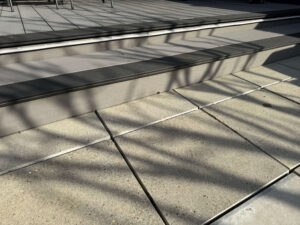
How Long Does PVC Decking Really Last?

PVC (Composite) Decking
How Long Does PVC Decking Really Last?
Exploring Real-Life Experiences and Expectations
PVC (polyvinyl chloride) decking—sometimes called composite decking—has gained popularity over the years as a low-maintenance, long-lasting alternative to traditional wood. With advertisements often promising a lifespan of 20 years or more, it’s no wonder so many homeowners turn to PVC decking for their outdoor spaces. But do these promises always hold true in the real world?
At Top Wasters, we specialize in disposing of waste materials that range from old furniture to construction debris. Recently, one of our clients reached out with a request to use our decking removal service– his old PVC decking after only five years suffered severe damage. This story stands in stark contrast to the widely marketed claim that PVC decking lasts for two decades or even more. The question then arises—how long does PVC decking really last?
In this blog post, we’ll take a closer look at the reality behind these lofty expectations. We’ll also discuss why some decking fails much earlier than expected, what factors play a role in its deterioration, and how to help your deck stand the test of time. Our goal is to keep it simple, helpful, and enjoyable to read, so let’s dive right in.
1. What Is PVC (Composite) Decking?
To start, let’s define what we’re talking about when we say “PVC decking.”
- Composite or PVC Decking: Often made of synthetic materials or a blend of synthetic and organic fibers (like wood dust or bamboo fibers), composite boards aim to look like wood while being more durable and easier to maintain. PVC decking is a subtype of composite decking that uses plastic (polyvinyl chloride) as its core material.
- The Big Selling Points: PVC and composite decking are usually advertised as resistant to rot, insects, and mildew. They don’t require staining or painting like traditional wood, and they promise to maintain their structural integrity for decades.
- The Expectation: Many brands confidently declare a 20-year (or more) lifespan. In some advertisements, you’ll see a “25-year fade and stain warranty,” or similar claims that spark hope for a long-lasting investment.
2. The Real-Life PVC Decking Story
At Top Wasters, we recently received a request from a customer who needed his old PVC deck removed. What made this job stand out was the fact that the deck was only about five years old. By no means is that a long time for something that’s supposed to last two to four times that length. In some cases, homeowners would expect at least ten to fifteen years of reliable performance before even considering a replacement.
What went wrong? The boards had become brittle, and there were visible cracks and holes. Water damage seemed to have seeped into the material, causing further damage. The deck had become unsafe for people to walk on, let alone host a gathering. The owner had no choice but to have it removed—and that’s where we stepped in.
This was a major disappointment for the homeowner, who had invested in PVC decking specifically for its promise of durability and long life. The frustration was huge, as you might imagine, and they wanted an explanation. Was it a problem with the installation, a defect in the materials, or something else entirely?
3. Why PVC Decking Sometimes Fails Early
Many factors can cause a deck—whether wood, composite, or PVC—to fail earlier than expected. Here are some of the biggest culprits:
- Poor Installation: Even if the material is top-notch, a subpar installation can quickly lead to problems. For instance, if the deck isn’t installed with proper spacing between boards, trapped moisture can lead to swelling or mold growth. Also, if the supporting structure underneath is weak, the deck won’t have a solid foundation, which can cause boards to crack or shift.
- Substandard Materials: Unfortunately, not all PVC decking brands are of the same quality. Some cheaper options might contain fillers or lower-grade plastic. If the deck boards are produced with inferior ingredients or manufacturing processes, it’s only a matter of time before they begin to deteriorate.
- Environmental Stressors: Extreme weather can wreak havoc on even the toughest decking materials. In areas with hot summers, intense UV rays can cause fading and brittleness. In cold climates, freeze-thaw cycles can cause cracks if moisture becomes trapped inside the material. Over time, these conditions may result in damage far earlier than the “20-year” mark.
- Lack of Proper Care: Even though PVC decking is often called “low-maintenance,” that doesn’t mean it requires zero maintenance. Dirt, leaves, and other debris can accumulate, leading to mold or mildew growth. An occasional cleaning and inspection can go a long way. When homeowners overlook these simple tasks, it speeds up the deck’s wear and tear.
- Deck Usage and Load: Some people plan large gatherings on their decks and may even use them for heavy items such as hot tubs or outdoor kitchens. Although PVC can handle a good amount of weight, consistent overloading can shorten the deck’s lifespan. In addition, heavy foot traffic, dragging furniture, or dropping sharp objects can all cause damage that accumulates over time.
4. How to Make Your PVC Decking Last
If you already have a PVC deck or you’re planning to get one, there are measures you can take to help it reach—or even surpass—its advertised lifespan.
- Quality Matters: Research reputable manufacturers and read reviews from people who have owned the product for several years, not just a few months. Sometimes, paying a little more for a trusted brand can save money and headaches down the road.
- Professional Installation: Invest in a skilled contractor who’s well-versed in PVC deck installation. Make sure they follow the guidelines set by the manufacturer regarding spacing, fastening, and support structure.
- Regular Cleaning and Care: Though it’s marketed as “low-maintenance,” you should still sweep away leaves, wash the deck surface a few times a year, and inspect for any damage. Catching small issues early can save your deck from bigger troubles.
- Protect It from the Elements: If you live in an area with extreme weather, consider adding some shade or coverings for your deck to shield it from excessive sun or ice. Also, be mindful of water drainage. Proper water run-off can prevent problems that come with standing moisture.
- Be Realistic About Use: PVC decking is strong, but it has its limits. If you’re planning a high-load project (like installing a large hot tub), confirm that your deck design can handle that weight. Spreading the load evenly with proper support can help avoid damage over time.
5. Should You Still Choose PVC Decking?
Despite stories like the one we encountered at Top Wasters—removing a failed five-year-old deck—PVC decking does have benefits. There are plenty of homeowners who’ve enjoyed their composite or PVC deck for 10, 15, or even 20 years with minimal issues. The main takeaway is that those advertised lifespans aren’t guaranteed; they’re more like a best-case scenario.
PVC decking can be a good fit if you:
- Don’t want the regular painting or staining that comes with wood.
- Desire a material that’s often (but not always) resistant to rot and insects.
- Prefer a modern look that’s consistent across all the boards.
- Plan to stay on top of basic maintenance tasks.
However, if you value the classic feel of wood and you’re willing to do the upkeep, high-quality wood decking can still last a very long time—though it usually requires more care to maintain its look and integrity. Ultimately, the best choice depends on your budget, climate, design preferences, and willingness to take care of the deck.
6. Lessons from a Five-Year Deck
The experience we had at Top Wasters with that damaged five-year-old PVC deck taught us a few things. One, it’s crucial to do thorough research and invest in high-quality materials. Two, even the best materials can fail without proper care and installation. Three, warranties and advertisements can be misleading if you’re not clear on the terms.
Sometimes, problems become obvious only after a few years of use. When companies advertise a product “lasting 20 years,” there may be clauses that specify what types of damage are covered. Many warranties only address specific manufacturing defects. Issues caused by improper installation, lack of maintenance, or harsh climates might not be covered. As a homeowner, knowing these details ahead of time can save you from disappointment later.
7. Final Thoughts: How Long Does PVC Decking Really Last?
While manufacturers tout two or more decades of lifespan, the real durability of PVC decking can vary widely. Your deck might last closer to five years—or it might last well over 20—depending on multiple factors: quality of materials, installation, environment, maintenance, and usage.
This is not to say PVC decking can’t be a great option. Many people are satisfied with the look and convenience it provides. But it’s wise to approach those long-term lifespan claims with a healthy dose of skepticism and do your due diligence.
- Stay informed. Read reviews, check out product forums, and don’t solely rely on glossy advertisements.
- Buy quality. If you opt for cheaper, unknown brands, there’s a higher chance you’ll be disappointed down the line.
- Hire a pro. Correct installation is key to avoiding many common failures.
- Maintain regularly. Even a “low-maintenance” deck does need some attention now and then.
With these steps, you’ll stand a better chance of having a PVC deck that lives up to—or comes close to—its promises. And if yours doesn’t make it the advertised 20 years, at least you’ll understand why and be prepared for the potential cost of removal and replacement.
Remember the story of that five-year deck we had to remove at Top Wasters—it serves as a reminder that while marketing might tell one story, real-world experience can be very different. By going in with realistic expectations and proper planning, you can get the most out of your PVC deck for as long as it can last.





